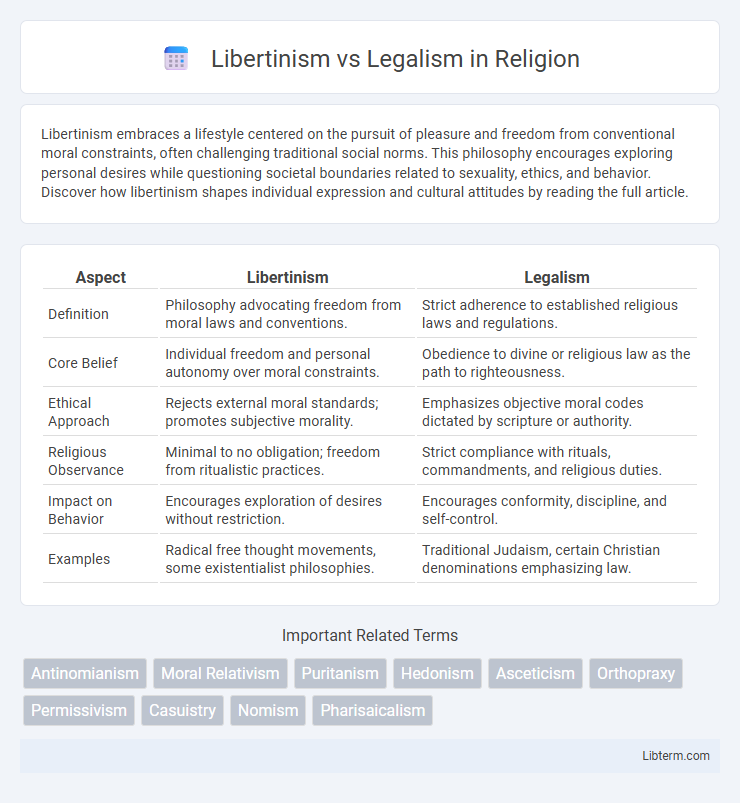Libertinism embraces a lifestyle centered on the pursuit of pleasure and freedom from conventional moral constraints, often challenging traditional social norms. This philosophy encourages exploring personal desires while questioning societal boundaries related to sexuality, ethics, and behavior. Discover how libertinism shapes individual expression and cultural attitudes by reading the full article.
Table of Comparison
| Aspect | Libertinism | Legalism |
|---|---|---|
| Definition | Philosophy advocating freedom from moral laws and conventions. | Strict adherence to established religious laws and regulations. |
| Core Belief | Individual freedom and personal autonomy over moral constraints. | Obedience to divine or religious law as the path to righteousness. |
| Ethical Approach | Rejects external moral standards; promotes subjective morality. | Emphasizes objective moral codes dictated by scripture or authority. |
| Religious Observance | Minimal to no obligation; freedom from ritualistic practices. | Strict compliance with rituals, commandments, and religious duties. |
| Impact on Behavior | Encourages exploration of desires without restriction. | Encourages conformity, discipline, and self-control. |
| Examples | Radical free thought movements, some existentialist philosophies. | Traditional Judaism, certain Christian denominations emphasizing law. |
Understanding Libertinism: Principles and Origins
Libertinism originates from 17th-century European philosophical movements emphasizing personal freedom and moral autonomy, rejecting established religious and societal norms. Its principles advocate for individual liberty, particularly in matters of sexuality and lifestyle, challenging strict moral codes and legal constraints. Libertinism contrasts sharply with legalism by prioritizing personal choice over rigid adherence to laws or ethical prescriptions.
Legalism Defined: Historical and Philosophical Context
Legalism, rooted in the Warring States period of ancient China, emphasizes strict adherence to law as the foundation of social order and governance, contrasting sharply with libertinism's focus on individual freedom and moral relativism. Philosophically, Legalism advocates for centralized authority, rigorous enforcement of rules, and utilitarian governance to maintain stability and discipline within the state. Its historical significance lies in its influence on the Qin dynasty's unification efforts, shaping the development of Chinese political theory by prioritizing state control over personal liberties.
Key Differences Between Libertinism and Legalism
Libertinism emphasizes personal freedom and rejects moral or religious constraints, promoting behavior driven by individual desires without adherence to traditional rules. Legalism strictly enforces moral laws and religious doctrines, upholding obedience and conformity as essential for societal order and spiritual discipline. The key difference lies in libertinism's prioritization of autonomy over rules, contrasted with legalism's focus on rule-governed conduct and authority.
Moral Implications of Libertinism
Libertinism promotes individual freedom and rejects conventional moral constraints, which can lead to ethical relativism and challenges in maintaining social order. The moral implications include potential disregard for communal responsibilities and an erosion of shared values, raising questions about accountability and the consequences of unrestrained behavior. This contrasts sharply with legalism, which emphasizes adherence to established rules to ensure consistent moral behavior and societal stability.
Social Consequences of Legalism
Legalism often results in a highly controlled society with strict laws and severe punishments, which can suppress individual freedoms and foster fear among the populace. This rigid social structure may lead to diminished creativity, social unrest, and resistance as people struggle under harsh regulations. Legalism's emphasis on order and discipline can create a compliant but oppressed community where personal initiative is stifled.
Libertinism in Modern Society
Libertinism in modern society emphasizes personal freedom, sexual liberation, and the rejection of traditional moral constraints, often challenging legalistic frameworks that impose rigid rules on behavior. This philosophy advocates for individual autonomy and self-expression, promoting diverse lifestyles and questioning laws seen as restrictive or outdated. The clash between libertinism and legalism highlights ongoing cultural debates about morality, legality, and personal rights in contemporary governance and social norms.
Legalism in Contemporary Legal and Religious Systems
Legalism in contemporary legal and religious systems emphasizes strict adherence to established rules and moral codes, often prioritizing law over individual freedoms. This approach can be seen in legal frameworks that enforce rigid statutory regulations and religious doctrines imposing clear, non-negotiable behavioral standards. Legalist perspectives influence judicial decisions, ethical guidelines, and institutional governance by upholding order, accountability, and uniformity within society.
The Balance: Navigating Between Libertinism and Legalism
Navigating between libertinism and legalism requires maintaining a balance that respects individual freedom while upholding ethical boundaries and social order. Libertinism emphasizes personal liberty and the rejection of conventional morals, whereas legalism prioritizes strict adherence to rules and laws to ensure harmony and justice. Striking this balance involves fostering a culture where moral responsibility complements freedom, preventing the extremes of indulgent excess or rigid authoritarianism.
Libertinism vs Legalism: Impact on Personal Freedom
Libertinism emphasizes personal freedom by rejecting traditional moral constraints, advocating for individual autonomy in behavior and expression. Legalism prioritizes strict adherence to laws and rules, often restricting personal freedom to maintain social order and discipline. The tension between libertinism and legalism shapes debates on the balance between individual rights and societal control.
Choosing a Path: Finding Harmony Between Liberty and Law
Balancing libertinism and legalism involves navigating the tension between personal freedom and societal order, where libertinism emphasizes individual autonomy and self-expression while legalism prioritizes strict adherence to rules and moral codes. Finding harmony requires recognizing the value of liberty in fostering creativity and personal growth alongside the necessity of laws to maintain social cohesion and protect rights. Embracing a nuanced approach allows individuals to exercise freedom responsibly within the framework of legal boundaries, promoting both ethical behavior and personal fulfillment.
Libertinism Infographic

 libterm.com
libterm.com